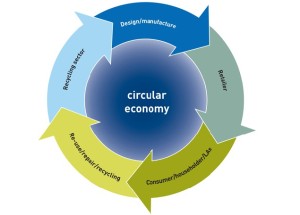Three reports call for action in the UK’s circular economy
July 25, 2014 at 3:02 pm | Posted in Uncategorized | Leave a commentTags: Circular Economy, government, infrastructure, Recovery, Resource
Yesterday, the Environmental Audit Committee issued its third report into the circular economy. The report called for urgent change to the way we consume goods – it also said that the Government lacked ambition and leadership in facilitating this change.
In ‘Circular Economy: ending the throwaway society’ the Committee’s MPs make 19 recommendations including:
- Lowering VAT on recycled products
- Providing longer warranties on consumer goods to increase time between purchase and disposal
- Reducing dependence on primary resource use for economic growth
- Revising the Packaging Recovery Note scheme to include and ‘offset’ or lower charges for products with a higher recycled content
- Introducing eco-design standards
The report also urges government to ban councils from sending food waste to landfill, instead using it in anaerobic digesters to produce biogas, renewable energy and fertiliser. Just 400,000 tonnes of the 7.2 million tonnes of food waste produced in the UK is used in this way each year.
These are all reasonable, achievable suggestions. But to really make the huge change away from traditional consumer behaviours and standard sales-focused business models is going to take more than a range of initiatives. It’ll be interesting to see how Government responds, what they say, what they do, and what they’re prepared to lead as we move ever closer to an election.
For sure, the throwaway society is no longer viable – and doing nothing is not an option. The cost of resources is rising rapidly and this is impacting both lifestyles and businesses. The circular economy won’t solve everything, but it can simulate manufacturing, boost the economy, and ensure that we don’t fall further behind both existing and emerging competitors.
The UK now needs to refocus its infrastructure to facilitate these essential changes. You can read the full report here: http://www.publications.parliament.uk/pa/cm201415/cmselect/cmenvaud/214/214.pdf.
To see the list of MPs involved in the Environmental Audit Committee, click here: http://www.parliament.uk/business/committees/committees-a-z/commons-select/environmental-audit-committee/membership/
This wasn’t the only report calling for circular economy action issued this month. Two further reports came from the EEF and the Green Alliance. Below you’ll find a brief synopsis and links to each.
Materials for Manufacturing, Safeguarding Supply
Author: EEF
Published: July 2014
For full report click here
The circular economy has been talked about for the last couple of years. But what progress has the UK really made?
EEF, The Manufacturers’ Organisation says we haven’t done enough and says that we’re in real danger of falling significantly behind our global peers. They explain what China, USA, Germany, Japan and South Korea have done and what we can do to build upon their experiences.
Wasted opportunities: Smarter systems for resource recovery
Author: Green Alliance, Circular Economy Task Force (Benyon and Hazell)
Published: 15 July 2014
For full report click here
The Task Force report says that UK recycling policy has stalled. It says that the system is outdated and expensive, wasting £1.7 billion in resource value every year. This is a problem for the resource and recycling sector, but also wider industry who want to invest in and source recycled content from the UK.
This is the second report from the Circular Economy Task Force in which they show how a system focused on realising value in materials could work and what Government could do to support this.
An energy opportunity
November 7, 2013 at 3:07 pm | Posted in Uncategorized | Leave a commentTags: affordability, Big Six, Energy, energy market, energy policy, energy sector, energy security, government, green energy tax, policy, security, supply, UK
Since the summer the operation of UK energy markets have had a much- increased media and political profile. Across the board, questions have been raised about the ability of current market and institutional arrangements to deliver key policy outcomes in terms of security of supply, affordability and reduced reliance on fossil fuels.
Among the most pointed questions that politicians in both government and opposition have asked in recent weeks are:
- Whether, in a market dominated by just six major players, effective price competition is possible? Some have gone so far as to argue that the most recent round of announcements about energy price increases suggests collusion between the so-called ‘Big Six’
- What are the main drivers of ongoing price increases? Views on this vary widely. Some, including the ‘Big Six’, argue that increases are driven by structural factors outside companies’ control, including policy decisions relating to such things as levies to promote certain environmental outcomes such as increasing renewable energy generation and energy efficiency. Others – including Ed Miliband – suggest that the companies are simply maximizing profit at the cost of hard-pressed consumers.
- Whether the existing regulators and the measures that they employ are strong enough to control such a complex market. In particular the role of Ofgem is under increasing scrutiny as it is seen to offer little in the way of resistance to upward pressure on prices. This may well be because its own role is confused. On the one hand, providing economic regulation and on the other being responsible for delivery of key environmental and low-carbon outcomes.
The political atmosphere around these issues has become febrile, fuelled by heated exchanges at Prime Minister’s questions, increasingly angry media coverage and pointed questioning of the motives of energy companies by Select Committees.
The issues that are raised are complex and, in one way or another, have been exercising industry and government for many years. So far, it has to be said, without much urgency or discernable progress. The current heightened tensions over these issues mean that the stakes for all parties have become much greater in the last few months. There have been major interventions, including:
- Labour’s pledge to freeze prices for 20 months should they return to office in 2015.
- David Cameron’s off-the-cuff announcement of a review to ‘roll back’ green energy taxes.
- Government’s announcement of the introduction of an annual review of competition in the sector.
- Hostile questioning of the major energy suppliers by the Commons Energy Select Committee that has culminated in the likelihood of a full-scale independent competition investigation.
The result of all of this is that the energy sector is going to be under unprecedented media and political scrutiny between now and the general election due in May 2015. It is also highly likely that energy policy will be one of the key battlegrounds in the election. And that means that the political parties will be working rapidly in the coming months to develop new energy policies to differentiate themselves from their rivals and gain some electoral edge.
For companies operating in the sector, whether as developers or operators or suppliers, this means a period of inevitable uncertainty. This can be both a threat (increasing wariness among investors, for example) and an opportunity, as it will allow the nimble and innovative to work within the various policy processes to secure outcomes that give benefits in the marketplace.
The coming months will present numerous opportunities for companies in this sector to highlight the positive contributions that they can make to achieving the triple aims of energy policy in energy security, decarbonisation and affordability. The arenas in which these issues are debated are crowded as interested parties seek to be heard. In these circumstances, making your case effectively through the media, political and policy channels is vital. It can even be turned to advantage to secure significant commercial benefit.
But effective engagement is not easy. It requires the right messages to be delivered to the right audiences at the right time. With many years’ experience advising clients in this sector, we have the skills, knowledge and networks to enable you to engage in the most efficient and effective ways.
Get in touch now to find out more about how we can help and to discuss any particular issues of concern to you.
Putting a dampener on ‘Great’ Britain: why negative advertising should be used with caution By Rebecca Morgan
February 7, 2013 at 10:00 am | Posted in Uncategorized | Leave a commentTags: audience, campaign planning, Channel 4, communications, government, Guardian, negative advertising, stakeholders
Last week, an anonymous government minister was quoted as saying the government is considering a negative advertising campaign to coincide with the expiration of existing EU immigration restrictions. Aimed at potential Bulgarian and Romanian immigrants, the campaign would “correct the impression that the streets here are paved with gold” by highlighting a struggling jobs market and disagreeable weather.
Although the campaign has not yet been given the go-ahead, it has already struck a bad chord with its intended Bulgarian and Romanian audience, ruffling political feathers and sparking demonstrations.
It has made waves on British shores too. Here, the proposed scheme caught the attention of both Channel 4 and the Guardian which both requested that their readers and viewers send in their own versions of the campaign.
A flurry of homemade ads followed which suggested that Britain’s streets are lined with flytipped rubbish, inebriated party-going youth and the discarded product of Britain’s troublesome press— sentiments that ministers may not have wished to encourage from a domestic audience. In an age of 24/7 digital media, the government should be aware that it can no longer have firm control over which audiences receive its messages.
Had it given greater consideration of the effects to their campaign, ministers would never have to experience their campaign backfiring at such an early stage. Proper communications campaign planning takes account of all stakeholders that may receive messages— intended or otherwise.
Can Coalition planning reforms help to re-build the economy? By Charlie Vavasour
October 18, 2012 at 12:30 pm | Posted in Uncategorized | Leave a commentTags: coalition, economy, government, infrastructure, planning
The Coalition’s hopes for economic recovery increasingly lie on the shoulders of infrastructure developers, and reforms to the UK’s planning policy have so far been seen as the vehicle to deliver substantive change and, ultimately, growth.
The government has recently revealed plans to stimulate house building across Britain. Planning regulations will be relaxed, applications fast-tracked, and first time buyers offered support. The Infrastructure (Financial Assistance) Bill, worth up to £50 billion in government guarantees, is currently under consideration by the Parliament. This is all good news for developers, who need both a more favourable planning system and better access to finance for proposed projects.
Yet much of the Coalition’s attitude to planning policy reform appears inconsistent, particularly with regards to the future of greenbelt land. In March the government published its National Planning Policy Framework, and (then) planning minster Greg Clark’s foreword stated: “Green Belt land that has been depleted of diversity can be refilled by nature.” Just months later, the Chancellor announced plans which will make it harder for residents to object to new developments and encourage councils to allow building on greenbelt land. How these proposals will fit in with the Localism Act and whether they will come to fruition or wither on the vine, as with the proposed privatisation of Britain’s forests, remains to be seen.
Relaxing planning policy is one step, and a useful one from a development standpoint. However, where waste management and energy infrastructure is concerned and energy-from-waste in particular, the ability of local communities to challenge and overturn planning decisions remains a constant thorn in the side of developers. The chief executive of Viridor, Colin Drummond, recently lambasted the “culture of the kneejerk judicial review” which disrupts and delays projects, even after development consent has been received. A reappraisal of the post-planning process and the potential for consent to be stripped retrospectively is appropriate, given the importance of nationally significant infrastructure projects to the economy’s future.
Blog at WordPress.com.
Entries and comments feeds.



